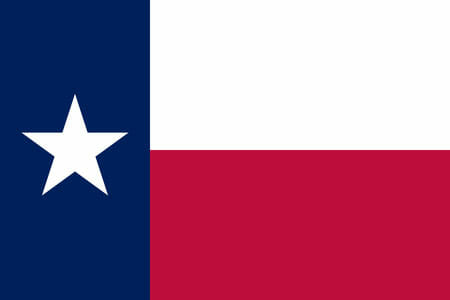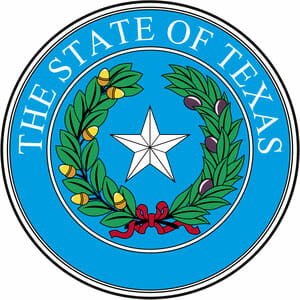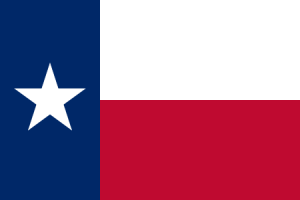
Social and religious conservatism makes Texas a prohibitive state when it comes to gambling. Legal gambling is limited to betting on horse races, state-sanctioned lottery games, and charitable gaming.
There are a handful of tribal casinos offering electronic bingo under the federal Indian Gaming Regulatory Act (IGRA). State authorities are not exactly thrilled about this and have a history of opposition to these operations.
| Allowed? | Notes | |
| Land-based gambling | Yes | Parimutuel and tribal venues only |
| Online gambling | No | |
| Sports betting | No | |
| Lottery | Yes | |
| Minimum gambling age |
Texas Gambling Law Summary
Gambling in Texas is defined as an “agreement to win or lose something of value solely or partially by chance.” The Texas Attorney General’s Office made it clear in the early 1990s that this also applies to internet games. Opinion no. DM-344 issued by then-Attorney General Dan Morales declares that local law enforcement officials have the power to go after individual players.
The same opinion states that people who engage in online gambling can’t argue that their activities fall under the exemption for private home games because gambling sites are available to the broader public. Placing an unlawful bet is considered a class C misdemeanor. However, despite the AG's opinion, this law has never been enforced against online gamblers.
Gambling in Texas is covered by Texas Penal Code PEN 47.01 et seq. and Texas Revised Civil Statutes CIV STAT 179e et seq. The minimum gambling age is 18 for lottery and 21 for casino and parimutuel betting.
Online Gambling in Texas
It's unlikely that Texas will legalize internet gambling in the current political climate. In 2023, a bill to legalize and regulate online sports betting failed to gain traction in the legislature.
State laws prohibit residents from playing on offshore gambling sites. Although, in practice, the law has never been enforced against internet players, this doesn't mean it might not be in the future.
According to Section 47 of the Texas Code, participating in any form of illegal gambling is a misdemeanor. Gambling in your home is an exception to this rule, but it’s hard to say whether this exception extends to online gambling in Texas.
Aside from the lottery-related regulations, Texas gambling-related statutes simply don’t mention online play, and state authorities have never tried prosecuting someone for playing at an offshore iGaming site.
Legal Texas Online Gambling Sites & Apps

- Accepts players from all US states
- Live dealer table games
- 200+ real-money games
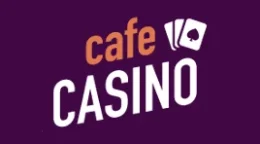
- Accepts 18+ players
- Largest selection of table games
- Solid reputation
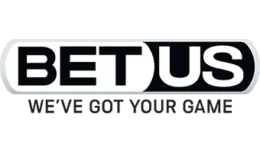
- Over 500 casino games
- Deposit with credit cards or crypto
- Accepts all US players (18+)
Texas Casinos
Casino-style gambling is entirely illegal in Texas outside of Indian reservations. Three tribes offer Class II gaming. The Kickapoo Traditional Tribe of Texas operates the biggest, the Lucky Eagle Casino in Eagle Pass on the Mexican border. Meanwhile, the Alabama-Coushatta and the Ysleta del Sur Pueblo (Tigua) operate the Naskila Entertainment Center in Livingston, and the Speaking Rock Casino in El Paso, respectively.
It hasn't always been easy for the latter two tribes, who were for decades embroiled in a legal battle with the state over their right to offer gaming on their reservations. That's because the 1986 act of Congress that restored their lands and recognized their sovereign status, the Texas Restoration Act (TRA), also prohibited them from organizing gaming.
Two years later, Congress passed IGRA, which codified Native American gaming rights and allowed tribes to offer class II gaming without state authorization. That meant the Kickapoo, which was recognized by a bill that contained no non-gaming clause, could develop its business without interference from the state. No such luck for the Alabama-Coushatta and Tigua tribes, who nevertheless argued that IGRA should override the non-gaming clause in TRA.
The case went all the way to the US Supreme Court, which, in June 2022, sided with the tribes, putting an end to a near three-decade legal battle. The ruling may also help tribes in other states that are bound by non-gaming clauses.
While commercial gaming remains illegal, Nevada-based casino giant LVS Corp has long had its eye on Texas and in recent years has ramped up its lobbying efforts in the state. This has resulted in successive legislative efforts to legalize commercial casinos, thus far unsuccessfully.
In November 2023, it was announced that LVS owner, the Adelson family, had agreed to purchase the Dallas Mavericks, which will undoubtedly increase the company's influence in the state.
Texas Poker
Even though Texas Hold ’em is named after the Lone Star State, playing poker or any other card games for money illegal outside a private residence or club and Native American reservations.
Several poker rooms have sprung up in cities like Austin, Dallas, Houston, San Antonio, Lubbock, and elsewhere in recent years. They believe they have exploited a loophole in the law that allows them to offer poker games legally.
Chapter 47 of the Texas Penal Code states:
It is a defense to prosecution [for gambling]” if “the actor engaged in gambling [is] in a private place; no person received any economic benefit other than personal winnings; [and] except for the advantage of skill or luck, the risks of losing and the chances of winning were the same for all.
The poker rooms argue they are private clubs and they refrain from acting as “the house” because they don’t take a rake. Instead, they charge customers by the hour to be at the venue.
In some cases, especially Dallas, local authorities beg to differ and have attempted to shut the clubs down. It's likely that the matter will eventually be settled in the Texas Supreme Court.
Texas Sports Betting
Sports betting in Texas is illegal, and the Supreme Court’s recent ruling that struck down PASPA, the federal ban, isn’t going to change that anytime soon. Online betting is illegal under the same provisions that prohibit playing poker or casino games over the internet.
Texas Parimutuel Betting
Texas legalized parimutuel betting on horse and dog races in 1933 in response to the economic hardships of the Great Depression, and then banned it four years later. It wasn't until 1987 that it was legalized again when voters approved an enabling amendment in a public referendum.
This allowed for the construction of racetracks, provided they have been approved by voters in local county elections. It also created the Texas Racing Commission to oversee the new industry. Simulcast betting was legalized in 1991.
There are currently three major horse racetracks in operation: Lone Star Park in Grand Prairie, Retama Park in Selma, and Sam Houston Race Park in Houston. Texas' only greyhound track, Gulf Greyhound Park closed in 2020. Although Texas is one of just a handful of states where it is legal, there is no longer any live dog racing in the state, although some racetracks are licensed for simulcast dog racing.
Texas Daily Fantasy Sports
DFS is legally gray in Texas. The largest DFS sites, FanDuel and DraftKings, offer their services to Texas residents, but the future is uncertain. Before 2016, DFS companies maintained that they operated in the Texas market legally because their contests were based on skill as opposed to luck.
In January 2016, Texas Attorney General Ken Paxton reviewed the legality of DFS in response to a request from Rep. Myra Crownover. He opined that engaging in such contests constituted illegal betting. As a result, FanDuel opted to withdraw from the market, while DraftKings chose to battle through the courts.
The lawsuit is still pending, during which time DraftKings has continued to offer contests to Texas residents, with FanDuel rejoining the market in 2018.
Texas Lottery
The Texas Lottery offers local draw games, multi-state lotto (Mega Millions and Powerball), scratch games, and all-or-nothing. The lottery isn’t allowed to sell any tickets over the internet, and its website is for information purposes only. Consequently, Texans looking to participate in any of the available games need to visit one of the land-based retail outlets.
Texas Bingo
Bingo is considered legal as long as it’s a charity game. Operating a commercial parlor or an online bingo service is illegal, which means that Texans don’t have access to any state-sanctioned bingo sites. Playing on an offshore platform constitutes unlawful betting and is treated in the same way as playing on offshore poker networks or casino sites.
Texas Legal Gambling FAQ
What types of gambling are available in TX?
Land-based gambling is available at the state's three tribal casinos and at racetracks. Like most US states, Texas operates a lottery. Social gambling and charitable gambling are allowed, but the state doesn’t have any regulated online gambling sites.
Who regulates gambling in Texas?
The National Indian Gaming Commission (NIGC) regulates Texas' tribal casinos. The Racing Commission of Texas oversees horse and greyhound racing, while the Texas Lottery is regulated by the state's Lottery Commission.
Is it legal to gamble at casinos in Texas?
Yes, provided they are based on tribal reservations. Texans can gamble at three land-based tribal casinos: the Kickapoo Lucky Eagle in Eagle Pass, Naskila Gaming in Livingston, and the Speaking Rock Casino in El Paso.
What laws cover online gambling in Texas?
The rules and regulations that have to do with gambling, in general, are listed in Section 47 of the Texas Code. Online play is never mentioned in the passages referring to casino-style games and sports betting activities, so it’s tough to determine whether those general regulations apply to offshore sites’ customers or not.
Texas Statutes
CHAPTER 47. GAMBLING
§ 47.01. Definitions
In this chapter:
(1) "Bet" means an agreement to win or lose something of value solely or partially by chance. A bet does not include:
(A) contracts of indemnity or guaranty, or life, health, property, or accident insurance;
(B) an offer of a prize, award, or compensation to the actual contestants in a bona fide contest for the determination of skill, speed, strength, or endurance or to the owners of animals, vehicles, watercraft, or aircraft entered in a contest; or
(C) an offer of merchandise, with a value not greater than $25, made by the proprietor of a bona fide carnival contest conducted at a carnival sponsored by a nonprofit religious, fraternal, school, law enforcement, youth, agricultural, or civic group, including any nonprofit agricultural or civic group incorporated by the state before 1955, if the person to receive the merchandise from the proprietor is the person who performs the carnival contest.
(2) "Bookmaking" means:
(A) to receive and record or to forward more than five bets or offers to bet in a period of 24 hours;
(B) to receive and record or to forward bets or offers to bet totaling more than $1,000 in a period of 24 hours; or
(C) a scheme by three or more persons to receive, record, or forward a bet or an offer to bet.
(3) "Gambling place" means any real estate, building, room, tent, vehicle, boat, or other property whatsoever, one of the uses of which is the making or settling of bets, bookmaking, or the conducting of a lottery or the playing of gambling devices.
(4) "Gambling device" means any electronic, electromechanical, or mechanical contrivance not excluded under Paragraph (B) that for a consideration affords the player an opportunity to obtain anything of value, the award of which is determined solely or partially by chance, even though accompanied by some skill, whether or not the prize is automatically paid by the contrivance. The term:
(A) includes, but is not limited to, gambling device versions of bingo, keno, blackjack, lottery, roulette, video poker, or similar electronic, electromechanical, or mechanical games, or facsimiles thereof, that operate by chance or partially so, that as a result of the play or operation of the game award credits or free games, and that record the number of free games or credits so awarded and the cancellation or removal of the free games or credits; and
(B) does not include any electronic, electromechanical, or mechanical contrivance designed, made, and adapted solely for bona fide amusement purposes if the contrivance rewards the player exclusively with noncash merchandise prizes, toys, or novelties, or a representation of value redeemable for those items, that have a wholesale value available from a single play of the game or device of not more than 10 times the amount charged to play the game or device once or $5, whichever is less.
(5) "Altered gambling equipment" means any contrivance that has been altered in some manner, including, but not limited to, shaved dice, loaded dice, magnetic dice, mirror rings, electronic sensors, shaved cards, marked cards, and any other equipment altered or designed to enhance the actor's chances of winning.
(6) "Gambling paraphernalia" means any book, instrument, or apparatus by means of which bets have been or may be recorded or registered; any record, ticket, certificate, bill, slip, token, writing, scratch sheet, or other means of carrying on bookmaking, wagering pools, lotteries, numbers, policy, or similar games.
(7) "Lottery" means any scheme or procedure whereby one or more prizes are distributed by chance among persons who have paid or promised consideration for a chance to win anything of value, whether such scheme or procedure is called a pool, lottery, raffle, gift, gift enterprise, sale, policy game, or some other name.
(8) "Private place" means a place to which the public does not have access, and excludes, among other places, streets, highways, restaurants, taverns, nightclubs, schools, hospitals, and the common areas of apartment houses, hotels, motels, office buildings, transportation facilities, and shops.
(9) "Thing of value" means any benefit, but does not include an unrecorded and immediate right of replay not exchangeable for value.
§ 47.02. Gambling
(a) A person commits an offense if he:
(1) makes a bet on the partial or final result of a game or contest or on the performance of a participant in a game or contest;
(2) makes a bet on the result of any political nomination, appointment, or election or on the degree of success of any nominee, appointee, or candidate; or
(3) plays and bets for money or other thing of value at any game played with cards, dice, balls, or any other gambling device.
(b) It is a defense to prosecution under this section that:
(1) the actor engaged in gambling in a private place;
(2) no person received any economic benefit other than personal winnings; and
(3) except for the advantage of skill or luck, the risks of losing and the chances of winning were the same for all participants.
(c) It is a defense to prosecution under this section that the actor reasonably believed that the conduct:
(1) was permitted under Chapter 2001, Occupations Code;
(2) was permitted under Chapter 2002, Occupations Code;
(3) consisted entirely of participation in the state lottery authorized by the State Lottery Act (Chapter 466, Government Code);
(4) was permitted under the Texas Racing Act (Article 179e, Vernon's Texas Civil Statutes); or
(5) consisted entirely of participation in a drawing for the opportunity to participate in a hunting, fishing, or other recreational event conducted by the Parks and Wildlife Department.
(d) An offense under this section is a Class C misdemeanor.
(e) It is a defense to prosecution under this section that a person played for something of value other than money using an electronic, electromechanical, or mechanical contrivance excluded from the definition of "gambling device" under Section 47.01(4)(B).
§ 47.03. Gambling Promotion
(a) A person commits an offense if he intentionally or knowingly does any of the following acts:
(1) operates or participates in the earnings of a gambling place;
(2) engages in bookmaking;
(3) for gain, becomes a custodian of anything of value bet or offered to be bet;
(4) sells chances on the partial or final result of or on the margin of victory in any game or contest or on the performance of any participant in any game or contest or on the result of any political nomination, appointment, or election or on the degree of success of any nominee, appointee, or candidate; or
(5) for gain, sets up or promotes any lottery or sells or offers to sell or knowingly possesses for transfer, or transfers any card, stub, ticket, check, or other device designed to serve as evidence of participation in any lottery.
(b) An offense under this section is a Class A misdemeanor.
§ 47.04. Keeping a Gambling Place
(a) A person commits an offense if he knowingly uses or permits another to use as a gambling place any real estate, building, room, tent, vehicle, boat, or other property whatsoever owned by him or under his control, or rents or lets any such property with a view or expectation that it be so used.
(b) It is an affirmative defense to prosecution under this section that:
(1) the gambling occurred in a private place;
(2) no person received any economic benefit other than personal winnings; and
(3) except for the advantage of skill or luck, the risks of losing and the chances of winning were the same for all participants.
(c) An offense under this section is a Class A misdemeanor.
§ 47.05. Communicating Gambling Information
(a) A person commits an offense if, with the intent to further gambling, he knowingly communicates information as to bets, betting odds, or changes in betting odds or he knowingly provides, installs, or maintains equipment for the transmission or receipt of such information.
(b) It is an exception to the application of Subsection (a) that the information communicated is intended for use in placing a lawful wager under Article 11, Texas Racing Act (Article 179e, Vernon's Texas Civil Statutes), and is not communicated in violation of Section 14.01 of that Act.
(c) An offense under this section is a Class A misdemeanor.
§ 47.06. Possession of Gambling Device, Equipment, or Paraphernalia
(a) A person commits an offense if, with the intent to further gambling, he knowingly owns, manufactures, transfers, or possesses any gambling device that he knows is designed for gambling purposes or any equipment that he knows is designed as a subassembly or essential part of a gambling device.
(b) A person commits an offense if, with the intent to further gambling, he knowingly owns, manufactures, transfers commercially, or possesses any altered gambling equipment that he knows is designed for gambling purposes or any equipment that he knows is designed as a subassembly or essential part of such device.
(c) A person commits an offense if, with the intent to further gambling, the person knowingly owns, manufactures, transfers commercially, or possesses gambling paraphernalia.
(d) It is a defense to prosecution under Subsections (a) and (c) that:
(1) the device, equipment, or paraphernalia is used for or is intended for use in gambling that is to occur entirely in a private place;
(2) a person involved in the gambling does not receive any economic benefit other than personal winnings; and
(3) except for the advantage of skill or luck, the chance of winning is the same for all participants.
(e) An offense under this section is a Class A misdemeanor.
(f) It is a defense to prosecution under Subsection (a) or (c) that the person owned, manufactured, transferred, or possessed the gambling device, equipment, or paraphernalia for the sole purpose of shipping it to another jurisdiction where the possession or use of the device, equipment, or paraphernalia was legal.
(g) A district or county attorney is not required to have a search warrant or subpoena to inspect a gambling device or gambling equipment or paraphernalia on an ocean-going vessel that enters the territorial waters of this state to call at a port in this state.
§ 47.07. Evidence
In any prosecution under this chapter in which it is relevant to prove the occurrence of a sporting event, a published report of its occurrence in a daily newspaper, magazine, or other periodically printed publication of general circulation shall be admissible in evidence and is prima facie evidence that the event occurred.
§ 47.08. Testimonial Immunity
(a) A party to an offense under this chapter may be required to furnish evidence or testify about the offense.
(b) A party to an offense under this chapter may not be prosecuted for any offense about which he is required to furnish evidence or testify, and the evidence and testimony may not be used against the party in any adjudicatory proceeding except a prosecution for aggravated perjury.
(c) For purposes of this section, "adjudicatory proceeding" means a proceeding before a court or any other agency of government in which the legal rights, powers, duties, or privileges of specified parties are determined.
(d) A conviction under this chapter may be had upon the uncorroborated testimony of a party to the offense.
§ 47.09. Other Defenses
(a) It is a defense to prosecution under this chapter that the conduct:
(1) was authorized under:
(A) Chapter 2001, Occupations Code;
(B) Chapter 2002, Occupations Code; or
(C) the Texas Racing Act (Article 179e, Vernon's Texas Civil Statutes);
(2) consisted entirely of participation in the state lottery authorized by Chapter 466, Government Code; or
(3) was a necessary incident to the operation of the state lottery and was directly or indirectly authorized by:
(A) Chapter 466, Government Code;
(B) the lottery division of the Texas Lottery Commission;
(C) the Texas Lottery Commission; or
(D) the director of the lottery division of the Texas Lottery Commission.
(b) It is an affirmative defense to prosecution under Sections 47.04, 47.06(a), and 47.06(c) that the gambling device, equipment, or paraphernalia is aboard an ocean-going vessel that enters the territorial waters of this state to call at a port in this state if:
(1) before the vessel enters the territorial waters of this state, the district attorney or, if there is no district attorney, the county attorney for the county in which the port is located receives notice of the existence of the device, equipment, or paraphernalia on board the vessel and of the anticipated dates on which the vessel will enter and leave the territorial waters of this state;
(2) at all times while the vessel is in the territorial waters of this state all devices, equipment, or paraphernalia are disabled, electronically or by another method, from a remote and secured area of the vessel in a manner that allows only the master or crew of the vessel to remove any disabling device;
(3) at all times while the vessel is in the territorial waters of this state any disabling device is not removed except for the purposes of inspecting or repairing the device, equipment, or paraphernalia; and
(4) the device, equipment, or paraphernalia is not used for gambling or other gaming purposes while the vessel is in the territorial waters of this state.
§ 47.10. American Documentation of Vessel Required
If 18 U.S.C. Section 1082 is repealed, the affirmative defenses provided by Section 47.09(b) apply only if the vessel is documented under the laws of the United States.
Texas Sweepstakes Act
BUSINESS & COMMERCE CODE
CHAPTER 622. SWEEPSTAKES
Sec. 622.001. DEFINITIONS. In this chapter:
(1) "Credit card" means a card that, if covered by the law of this state, would be subject to a lender credit card agreement, as defined by Section 301.002, Finance Code, except that the term does not exclude a card that is subject to an agreement under which:(A) the obligations are payable in full each month and not deferred; and(B) no finance charge is assessed when the obligations are paid.
(2) "Debit card" means a card offered by an institution the deposits of which are insured by the Federal Deposit Insurance Corporation or another agency, corporation, or instrumentality chartered by the United States government.
(3) "Imply" means to use any means by which an implication can be conveyed, including:(A) a statement, question, or request;(B) conduct;(C) a graphic or symbol; and(D) lettering, coloring, font size, font style, or formatting.
(4) "Sweepstakes" means a contest that awards one or more prizes based on chance or the random selection of entries.
Sec. 622.002. ACTS CONSTITUTING CONDUCTING SWEEPSTAKES. For purposes of this chapter, a person conducts a sweepstakes if the person distributes material that:
(1) promotes a sweepstakes;
(2) describes one or more sweepstakes prizes;
(3) states one or more sweepstakes rules;
(4) includes a current or future opportunity to enter a sweepstakes; or
(5) provides a method for the recipient of the material to obtain additional information about a sweepstakes.
SUBCHAPTER B. APPLICABILITY OF CHAPTERSec. 622.051. CHAPTER LIMITED TO SWEEPSTAKES CONDUCTED THROUGH MAIL; EXCEPTION. (a) This chapter applies only to a sweepstakes conducted through the mail.(b) This chapter does not apply to a sweepstakes for which the only use of the mail is for a consumer to return an entry form to the sweepstakes sponsor.
Sec. 622.052. PRIZE VALUE LESS THAN $50,000.
(a) This chapter does not apply to a sweepstakes in which the value of the most valuable prize is less than $50,000.
(b) For purposes of this section, the value of a prize is the greatest of the prize's:(1) face value;(2) fair market value; or(3) present financial value.
Sec. 622.053. ADVERTISEMENT OR INSERT IN MAGAZINE, NEWSPAPER, OR CATALOG.
This chapter does not apply to a sweepstakes conducted through an advertisement or insert in:
(1) a magazine or newspaper:(A) that is a publication in which more than 40 percent of the total column inches in each issue consist of advertising space purchased by companies other than:(i) the publisher;(ii) an affiliate of the publisher; or(iii) a vendor for the publisher or an affiliate; and(B) that is a publication for which more than 50 percent of the total number of copies distributed of each issue are provided to customers who paid for the copy; or
(2) a catalog that is a promotional booklet listing merchandise for sale and that:(A) is at least 24 pages long;(B) has a circulation of at least 250,000; and(C) either:(i) requires customers to go to a physical location to purchase the advertised items; or(ii) is published by a company that derives more than 50 percent of the company's total gross revenue from sales occurring at physical locations.
Sec. 622.054. CHARITABLE RAFFLE.
This chapter does not apply to a charitable raffle regulated by Chapter 2002, Occupations Code.
Sec. 622.055. SWEEPSTAKES REGULATED BY ALCOHOLIC BEVERAGE CODE. This chapter does not apply to a sweepstakes regulated by the Alcoholic Beverage Code.
Sec. 622.056. COMPANY REGULATED UNDER PUBLIC UTILITY REGULATORY ACT. This chapter does not apply to a company regulated under Title 2, Utilities Code.
Sec. 622.057. AIR CARRIER; AIRMAN ASSOCIATION. This chapter does not apply to:(1) a company that is an air carrier subject to Title 49, United States Code; or(2) a nonprofit association of airmen who are subject to that title.
Sec. 622.058. CERTAIN RECREATIONAL EVENTS. This chapter does not apply to a drawing for the opportunity to participate in a hunting, fishing, or other recreational event conducted by the Parks and Wildlife Department.
Sec. 622.059. CERTAIN FOOD PRODUCTS. This chapter does not apply to a sweepstakes promoting one or more food products regulated by the United States Food and Drug Administration or the United States Department of Agriculture.
Sec. 622.060. AUDIOVISUAL ENTERTAINMENT WORK, PRODUCT, OR SOUND RECORDING. This chapter does not apply to a company if 75 percent or more of the company's business is:
(1) the systematic development, planning, and execution of creating audiovisual entertainment works, products, or sound recordings; and
(2) the distribution, sale, and marketing of those works, products, or recordings.
Sec. 622.061. CABLE SYSTEM. This chapter does not apply to a company that owns or operates a cable system, as defined by 47 U.S.C. Section 522, as amended.
SUBCHAPTER C. PROHIBITED ACTS OR CONDUCTSec. 622.101. CONNECTING SWEEPSTAKES ENTRY OR OPERATION TO ORDER OR PURCHASE.
(a) A person conducting a sweepstakes may not use a mechanism for entering the sweepstakes that:
(1) has any connection to ordering or purchasing a good or service;
(2) is not identical for all individuals entering the sweepstakes; and
(3) does not have printed on the entry form, in a font size at least as large as the largest font size used on the entry form, the following language: "Buying Will Not Help You Win. Your chances of winning without making a purchase are the same as the chances of someone who purchases something. It is illegal to give any advantage to buyers in a sweepstakes."
(b) A person conducting a sweepstakes may not:
(1) require an individual to order, purchase, or promise to purchase a good or service to enter the sweepstakes;
(2) automatically enter an individual in the sweepstakes because the individual ordered, purchased, or promised to order or purchase a good or service; or
(3) solicit business using an order form or purchasing mechanism that has any role in the operation of the sweepstakes.
(c) Subsections (a)(1) and (b)(3) do not apply to a single sheet of paper that contains both a sweepstakes entry form and an order form if:
(1) the order form is perforated or detachable; and
(2) the entry form must be separated from the order form and returned to a different address than the order form.
(d) Subsections (a) and (b)(2) and (3) do not apply to a sweepstakes offered to promote a credit card or debit card if the official rules of the sweepstakes provide that consumers are entered in the sweepstakes based on the number of purchases made or the amount of money spent. The exception provided by this subsection applies only to a person offering a sweepstakes who qualified as an issuer as of January 1, 2001.
(e) Subsections (a) and (b)(2) and (3) do not apply to a company offering a sweepstakes in which the consumer must go to a physical location to obtain or use the goods or services being sold by the company.
Sec. 622.102. USING MULTIPLE SWEEPSTAKES ENTRY ADDRESSES OR MULTIPLE PURPOSES FOR ADDRESS. A person conducting a sweepstakes who provides for entering the sweepstakes by mail may not:
(1) accept entries at more than one address; or
(2) use the address for entry in the sweepstakes for any other purpose.
Sec. 622.103. ALLOWING CHOICE OF PRIZE OR INDICATION OF PREFERRED PRIZE CHARACTERISTICS. A person conducting a sweepstakes may not:
(1) solicit an individual to enter the sweepstakes by invitation or other opportunity; and
(2) allow the individual to choose, or indicate the preferred characteristics of, a prize to be awarded in the sweepstakes unless the choice or indication:(A) is made on the sweepstakes entry form; and(B) does not appear on, and is not in any way connected to, an order form or other purchasing mechanism.
Sec. 622.104. SENDING SWEEPSTAKES MATERIAL THAT INCLUDES CERTAIN STATEMENTS OR IMPLICATIONS. A person conducting a sweepstakes may not send material accompanying or relating to the sweepstakes or an offer to enter the sweepstakes that:
(1) states or implies that:
(A) an individual must comply with a restriction or condition to enter the sweepstakes, unless all individuals entering the sweepstakes are required to comply with the identical restriction or condition;
(B) an individual's chances of winning a prize in the sweepstakes are higher, lower, or different in any way because of a factor or circumstance that does not relate to the manner in which a winner is selected;
(C) a winner will be selected at a time or place or in a manner that is different from the actual time or place at which or manner in which a winner is selected;
(D) an individual who orders or purchases a good or service will receive a benefit or be treated differently in the sweepstakes in comparison to an individual who does not order or purchase a good or service; or
(E) an individual who does not order or purchase a good or service will be disadvantaged or treated differently in the sweepstakes in comparison to an individual who orders or purchases a good or service;
(2) states or implies falsely that the individual receiving the material has received special treatment or personal attention from the offeror of the sweepstakes or any officer, employee, or agent of the offeror; or
(3) states that the recipient of the material:
(A) is a winner, if the recipient is not a winner;
(B) may be a winner;
(C) will be a winner if certain conditions are met or certain events occur;
(D) may be or will be among the group from which a winner will be selected; or
(E) has in any way a better chance than another individual of being chosen as a winner.
Sec. 622.105. USING GAME PIECE TO CONVEY INFORMATION OR OFFER TO ENTER. A person conducting a sweepstakes may not convey information about the sweepstakes or an offer to enter the sweepstakes by using a scratch-off device or any other game piece that suggests an element of chance or luck.
Sec. 622.106. PUBLISHING ADVERTISEMENTS OR RULES WITH INCONSISTENT OR INCOMPLETE PRIZE DESCRIPTIONS. A person conducting a sweepstakes may not publish or cause to be published:
(1) different advertisements for the same sweepstakes that contain inconsistent descriptions of the grand prize to be awarded through the sweepstakes; or
(2) official rules of the sweepstakes that do not uniquely identify the prizes to be awarded and the date the prizes will be awarded.
Sec. 622.107. ENGAGING IN CONDUCT THAT FALSELY INDICATES AN INDIVIDUAL HAS WON. A person conducting a sweepstakes may not:
(1) ask an individual to provide any information or take any action consistent with the individual winning a sweepstakes prize, unless the individual has won a sweepstakes prize; or
(2) provide an individual who has not yet won a sweepstakes prize with a document or other item that simulates an event, circumstance, or condition connected with being a sweepstakes winner.
Sec. 622.108. AWARDING MULTIPLE PRIZES. A person conducting a sweepstakes may not award multiple prizes in the sweepstakes unless all prizes are awarded on the same date and through the same selection process.
Sec. 622.109. MAILING CERTAIN OFFERS DURING PERIOD FOLLOWING SWEEPSTAKES. A person conducting a sweepstakes may not, during the 30-day period immediately following the last date on which the person conducted the sweepstakes through the mail, offer through the mail:
(1) an opportunity to enter a sweepstakes; or
(2) a nonsweepstakes prize, gift, premium, giveaway, or skill contest.
Sec. 622.110. PROVIDING NAMES OR ADDRESSES USED IN PROHIBITED SWEEPSTAKES. A person may not provide names or addresses of residents of this state that are used in conducting a sweepstakes that the person knows violates this chapter.
SUBCHAPTER D. ACTS OR CONDUCT NOT PROHIBITED
Sec. 622.151. DESCRIPTION OF METHOD OF CHOOSING WINNER. This chapter does not prohibit a sweepstakes sponsor from describing in the official sweepstakes rules the method to be used in choosing a winner.
Sec. 622.152. NOTIFICATION OF AND AFFIDAVIT FROM WINNER. This chapter does not prohibit a sweepstakes sponsor, after a winner has been chosen, from:(1) notifying an individual chosen as a winner; or
(2) obtaining from an individual chosen as a winner an affidavit to verify that the individual:(A) is eligible to win the prize; and(B) has complied with the sweepstakes rules.
SUBCHAPTER E. ENFORCEMENTSec. 622.201.
ACTION BY ATTORNEY GENERAL; VENUE.
The attorney general may bring an action under this chapter by filing suit in a district court in Travis County or in any county in which a violation occurred.
Sec. 622.202. CIVIL PENALTY.
(a) The court shall award the attorney general a civil penalty of not less than $5,000 or more than $50,000 for each violation found.
(b) If the material accompanying or relating to a sweepstakes or an offer to enter a sweepstakes contains multiple statements, implications, representations, or offers that are prohibited by this chapter, each statement, implication, representation, or offer is a separate violation and results in a separate civil penalty. Each individual who receives the material constitutes an additional and separate group of violations of this chapter.
Sec. 622.203. LIABILITY FOR PROVIDING NAMES OR ADDRESSES USED IN PROHIBITED SWEEPSTAKES.
(a) A person who violates Section 622.110 is liable for the cumulative civil penalties that result from the person's conduct.
(b) Liability of a person under Subsection (a) does not reduce the liability of the person who conducted the sweepstakes.
Sec. 622.204. INJUNCTIVE AND OTHER RELIEF.
The court may also award injunctive relief or other equitable or ancillary relief that is reasonably necessary to prevent violations of this chapter.
Sec. 622.205. NO PRIVATE RIGHT OF ACTION. This chapter does not create a private right of action.
Sec. 622.206. RECOVERY OF EXPENSES BY ATTORNEY GENERAL.
If the attorney general substantially prevails, the court shall award the attorney general reasonable expenses incurred in recovering a civil penalty under this subchapter, including court costs, reasonable attorney's fees, reasonable investigative costs, witness fees, and deposition expenses.



